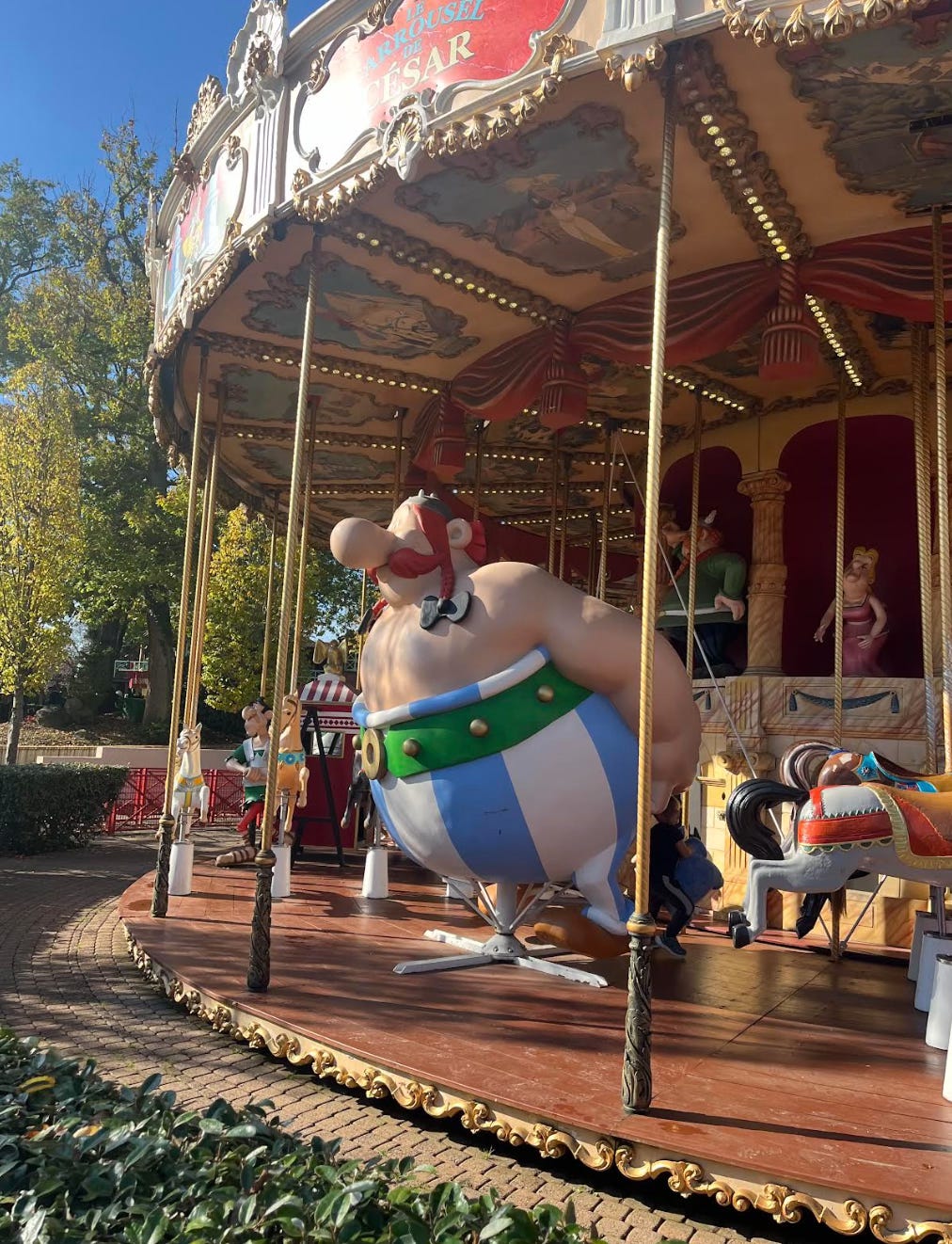The mysterious power of the word ‘exceptionnellement’
French exceptions, J-P Sartre, Astérix the Gaul and very clever writers
Dear Friend,
I hope autumn is treating you gently.
While I’d love to say I’ve spent recent weeks being aspirational - going to a busy roster of exhibitions, say, or sitting be-scarfed in café-terraces putting the world to rights - I’m afraid it’s been altogether less glam than that - though enjoyable in its own way.
Last week I had the opportunity to relive an early Paris memory.
My love affair with the city started in earnest on an A-Level trip here when I was 16. The excursion was led by the head of my college’s language department, Rina, a petite and chic whirl of wisdom and dazzling linguistic ability.
Originally from Italy, Rina had gone to the Sorbonne in the Sixties, where she met her French husband with whom she then moved to London. She spoke Italian, French, Spanish and English. She drank real coffee and brought back Petits Ecoliers chocolate biscuits from her regular trips to France; all these factors combined made her the height of European sophistication in my eyes.
On the five-day trip, she guided our group around different Paris sights, from the cobbled streets of the Marais to the resplendent stained glass of the Sainte-Chapelle. In the Latin Quarter, she enchanted us with tales of her student days: “Jean-Paul Sartre used to stand on this street corner - very ugly man!”.
We had a printed schedule detailing each excursion, except for the final day of the trip, which was blocked out and simply labelled with the words ‘Mystery activity’. We were intrigued, but not being very knowledgeable about Paris, we didn’t have many guesses to what the mystery activity might be. The evening before, it was announced proudly and incongruously by our precious Rina.
“Tomorrow we will be going to…Parc Astérix!!”.
Nobody had much pre-existing knowledge of Disneyland’s less famous and much more French cousin. But off we went on the suburban train and enjoyed the relatively tame roller coasters, the carousel where we rode inside a giant hollowed-out Obelix, and the buffet lunch in a giant Gaul-themed dining hall. The larger-than-life, gaudy themed world of the park, located in a northern suburb of the city, was such a contrast with the refined time we’d been having in central Paris, and an early reminder that France is a real place in the modern world.
When I recently got a press invitation to visit Parc Astérix - this year celebrating its 35th birthday! - naturally I agreed. It was just as camp and fun as I had remembered, unchanged by the long years elapsed, except the addition of some more hardcore roller coasters. The hollowed-out Obelix carousel was even still there, and the buffet banquet hall! I was delighted.
I think back to my first A-Level trip to Paris often, not least because without it I doubt whether I would live here now - and I go back to all the Paris places we visited on that trip regularly. But I am delighted now to have really gone full circle by returning to Parc Astérix!
The EXCEPTIONAL nature of French life
This week you can hear me on a podcast called ‘Navigating the French’ presented by very clever writer and cheese specialist (!)
. Each episode, she invites a guest to explore a French word that encapsulates something about the culture or an aspect of life here. I chose to talk about the word ‘exceptionnellement’ (exceptionally), which has layered meanings in French.Notably, it is a word we often hear in an administrative or institutional context to mean ‘as a one-off, ‘just on this occasion’. (An example: when my gym EXCEPTIONALLY swapped the men’s changing rooms with the women’s changing rooms for a day.)

The way this word is used tells a lot about how rules are seen here (i.e. complicated but contingent) vs. how they are seen in the UK and in the US, where Emily is from.
You can listen to the podcast about the maddening power of exceptionnellement and what it tells us about French culture by pressing the button below. I hope you enjoy it!
Thirty-second book club
I have been reading some SUPER MODERN novels, from 1861 and 1977 respectively.
First, Silas Marner by George Eliot. I first read this novel when I was a young teenager and I recently picked up the same edition from my old bookshelf on a trip back to London. It’s a short but perfectly crafted tale of a man, the eponymous Silas, who loses his community and faith after a betrayal early in his life. He moves to another part of England and constructs a new life that is predictable but limited and solitary. After fifteen years of this new existence, the reckless actions of a privileged townsperson throw Marner’s carefully ordered world into disarray once more. The tale that follows reminds me of the mantra I often repeated to myself when I adopted my puppy, Babbet, four years ago: ‘to bring love into your home, you must first accept chaos’.
After that I read Earthly Possessions by prolific American author Anne Tyler. It tells the story of a woman from a small town who marries someone local and lives a simple, small life. But she has dreams to escape, and one day she resolves to leave her husband, so she goes to the bank to withdraw her savings. While she’s at the bank, an armed robber kidnaps her and together they embark on a chaotic road trip. She quickly realises that her kidnapper is not very talented at kidnapping, and the story unfolds as an offbeat adventure that makes her reflect on her life to date. Like the Eliot book, it is short but perfectly crafted.
—
I have written before about my very clever friend, author and journalist
. Her podcast, In Writing, is one of my favourite things to listen to. In each episode, she interviews a successful writer, usually in the place where they write, which gives it a wonderful sense of place. Expanding on the podcast, she has now written an equally fascinating, clever, inviting and just downright helpful book called ‘In Writing: Conversations on Inspiration, Perspiration and Creative Desperation’. The book is divided into sections that interrogate different parts of the writing experience, such as - ‘Where do ideas come from?’, ‘What’s so hard about writing?’, ‘What can language do?’ and ‘What’s so hard about being read?’. Each section begins with a witty, thoughtful essay from Hattie, followed by extracts from the varied and talented writers she has interviewed, including Charlie Brooker, Wendy Cope, David Nicholls, George Saunders, Maggie O’Farrell, Michael Rosen, David Sadaris and many more illustrious people. It’s a superlative book for anyone interested in or even remotely curious about writing. It comes out this week! You can order it here or on Amazon, or pick up a copy wherever you shop for books.Thank you for reading this letter about ‘ugly’ J-P Sartre, Astérix the Gaul, exceptional French life and clever writers. Thank you to all those who kindly wrote back to my last letter, too.
As ever, if you enjoyed this Pen Friend letter, please consider sharing it with a friend of yours who you think might like it too.
I will write very shortly! Take care until then.
Yours,
Hannah






Your French teacher made an interesting choice in taking you to the Parc Asterix! I enjoyed reading about it.
Your words about my book are trop gentil. Thank you so much lovely Hannah xxx